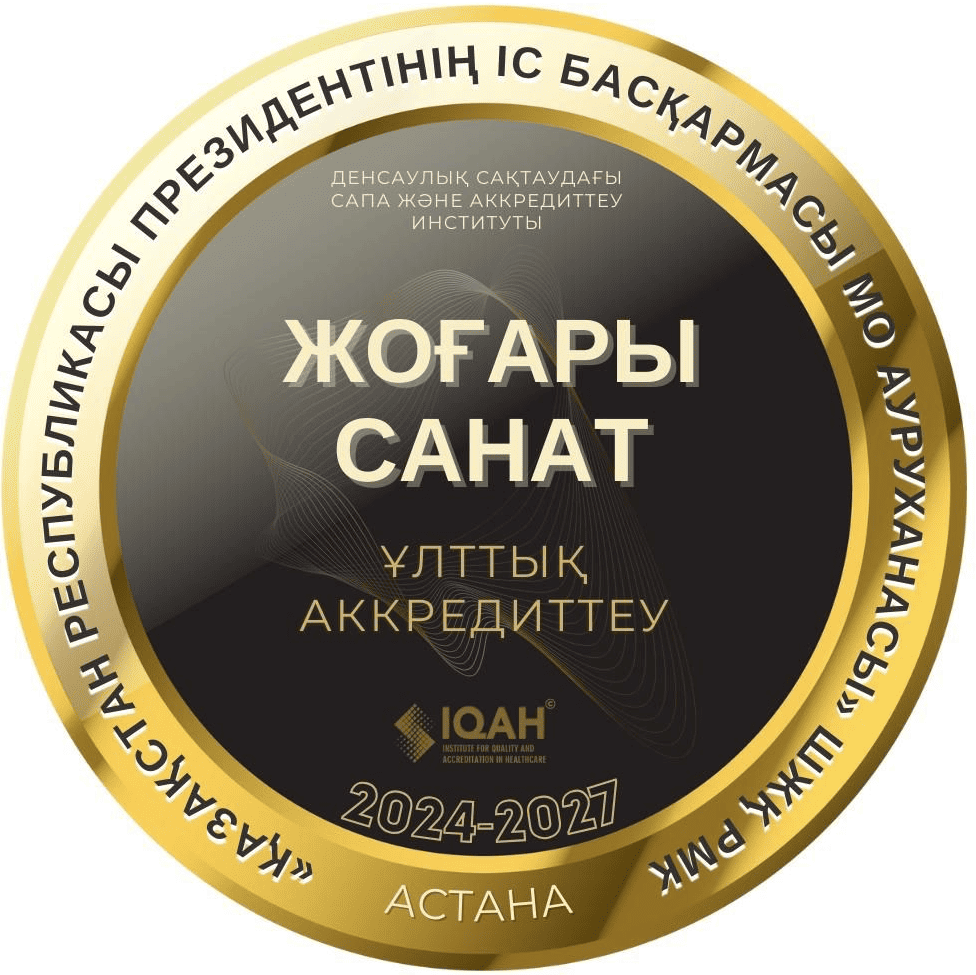Assessment of the prognostic value of structural genome variability for the development of coronary heart disease in type II diabetes mellitus in Kazakhs
Individual registration number АР14872367
Еxecution period – 2022 -2024 гг.
Source of funding - Ministry of Science and Higher Education of the Republic of Kazakhstan (contract №176/30-22-24 18 October 2022).
The head of the research group – Karabaeva Raushan Zhumartovna
The project aims to determine the predictive value of the structural variability of the genome represented 9 SNPs rs72652411, rs1011970, rs62560775, rs564398, rs10757278, rs4977574, rs1575972, rs1333051, rs2383208, on chromosome segment 9p21.3, for the development of coronary heart disease with type 2 diabetes in persons of the Kazakh population.
Project tasks.
- Collection and compilation of phenotypic and genotypic data on 600 study participants.
- Study of phenotype/genotypic associations of study participants with T2D, with CHD, with T2D and CHD, without T2D and CHD.
- Forming conclusions about the prognostic value of the structural variability of the genome, represented by different genotypes of ONP in the chromosome segment 9p21.3, for the Kazakh population in comparison with other populations. Evaluation of the possibility to consider the chromosomal segment 9p21.3 as a key molecular mechanism of the pathological interaction of coronary heart disease and T2D.
- Development, according to the received scientific data, of recommendations for clinical practice in the Republic of Kazakhstan.
Expected results.
- Based on new scientific data, a potential molecular target for the prevention, diagnosis and treatment of coronary heart disease and DM2 in the Kazakh population. The results of the study, which provide new knowledge about the molecular pathway of CHD and DM2, will expand the understanding of common points in pathogenesis and will have an impact on the directions of future research.
- 3 publications in a peer-reviewed scientific publication indexed in the Science Citation Index Expanded of the Web of Science database and (or) having a CiteScore percentile in the Scopus database of at least 35, 1 article in a peer-reviewed foreign or domestic edition recommended by Committee for Quality Assurance in the Sphere of Education and Science, abstracts and 2 reports at international scientific and practical conferences, a patent for a utility model Kazakhstan Patent Office, methodological recommendations.
RESEARCH RESULTS
The obtained results fully correspond to the objectives of the calendar plan for 2023–2024 and include the following types of work:
Section No. 1 of the calendar plan – “Collection of phenotypic and genotypic data on study participants”:
- A total of 600 study participants were recruited.
- Phenotypic data on 128 indicators and 27 genotypic indicators were entered into a database.
- A second review of the data was conducted, errors were corrected, and questionable indicators were verified.
- For genotypic data collection, genotyping of the studied SNPs was carried out using a next-generation device — QuantStudio 12K Flex (Life Technologies) — utilizing microfluidic real-time PCR technology.
- The results of phenotyping and genotyping of the 600 participants were compiled into a statistical table and categorized according to phenotypic groups.
- Reagents were purchased for genotyping, and a list of SNPs of the genetic locus 9p21.3 was compiled for genotyping purposes.
Section No. 2 of the calendar plan – “Statistical analysis of the data in accordance with the study’s goals and objectives”:
- A review of 56 scientific publications was conducted, emphasizing the significance of variability in the chromosomal segment 9p21.3 for the development of coronary artery disease (CAD) and type 2 diabetes (T2D). The review highlighted the growing relevance of this issue as understanding of its biological role deepens.
- The review titled “Evolution of the search for a common mechanism of congenital risk of coronary heart disease and type 2 diabetes mellitus in the chromosomal locus 9p21.3” was published in the peer-reviewed scientific journal edicine (United States, Wolters Kluwer Health), indexed in Science Citation Index Expanded, with a CiteScore percentile of 70 in Scopus.
- Initial scientific findings from the statistical analysis were published in the journal Journal of Clinical Medicine of Kazakhstan (ISSN: 2313-1519), recommended by KKSON MSHE RK:
Myngbay A, Alibekov S. "CDKN2B-AS1 gene rs4977574 polymorphism in the severity of coronary artery disease in the Kazakh population".
J CLIN MED KAZ. 2023; 20(6):23-5.
https://doi.org/10.23950/jcmk/13918.
Section No. 3 of the calendar plan – “Formation of conclusions regarding the prognostic value of structural genome variability, represented by various SNP genotypes in the 9p21.3 chromosomal segment, for the Kazakh population compared with other populations”:
1. Scientific Article:
- Karabaeva RZ, Vochshenkova TA, Mussin NM, Albayev RK, Kaliyev AA, Tamadon A (2024). "Epigenetics of hypertension as a risk factor for the development of coronary artery disease in type 2 diabetes mellitus".
Front. Endocrinol. 15:1365738. doi: 10.3389/fendo.2024.1365738
(Impact Factor 3.9; SiteScore Q2, Scopus 60)
2. Conference Presentations and Abstracts:
- World Conference on Human Genomics and Genomic Medicine (WCHGGM - 24), April 2–3, 2024, Boston, USA
- RECENT ADVANCES IN MEDICAL AND HEALTH SCIENCES (ICRAMHS-2), April 5–6, 2024, New York, USA
Presentations:
- Nazira Bekenova, Alisher Aitkaliyev, Balzhan Kassiyeva, Tamara Vochshenkova: "The Role of Polymorphisms in the 9p21.3 Locus in the Development of Ischemic Heart Disease in the Presence of Diabetes Mellitus" – Oral presentation
- Nazira Bekenova, Alisher Aitkaliyev, Balzhan Kassiyeva, Tamara Vochshenkova: "Ischemic Heart Disease and Cardiac Autonomic Neuropathy: Common Patterns in Certain Links of Pathogenesis" – Poster presentation
In the collection of abstracts of the Multidisciplinary Congress "WORLD QUALITY STANDARDS AND INNOVATIONS IN MEDICINE" and the International Scientific and Practical Forum "HIGH TECHNOLOGIES IN MODERN SURGERY":
- Balzhan Kassiyeva, Tamara Vochshenkova, Alisher Aitkaliyev, Nazira Bekenova: "ISCHEMIC HEART DISEASE AND CARDIAC AUTONOMIC NEUROPATHY: COMMON PATTERNS IN CERTAIN LINKS OF PATHOGENESIS"
- Balzhan Kassiyeva, Tamara Vochshenkova, Alisher Aitkaliyev, Nazira Bekenova: "THE ROLE OF POLYMORPHISMS IN THE 9p21.3 LOCUS IN THE DEVELOPMENT OF ISCHEMIC HEART DISEASE IN THE PRESENCE OF DIABETES MELLITUS"
3. Patent (Protective Document):
- Utility model patent No. 9094:
"Method for predicting the risk of coronary artery disease in the context of type 2 diabetes in the Kazakh population"
(Authors: Karabaeva R.Zh., Bekenova N.B., Aitkaliyev A.D., Kassiyeva B.S., Voshchenkova T.A.)
Published in Bulletin No. 18, May 3, 2024, IPC: G01N 33/50, C12Q 1/00, C12Q 1/68 (2018.01)
Section No. 4 of the calendar plan – “Development of clinical practice recommendations in the Republic of Kazakhstan based on the obtained scientific data”:
- Clinical guidelines were developed and published:
“Single nucleotide polymorphism rs564398 for predicting the co-development of ischemic heart disease and type 2 diabetes in the Kazakh population”
(UDC: 616-37:575.2:616.12; BBK: 54.1; O-43. ISBN 978-601-7083-13-7)
Contact Information:
Karabaeva Raushan Zhumartovna
Phone: +7 (7172) 70-80-90, ext. 8003




